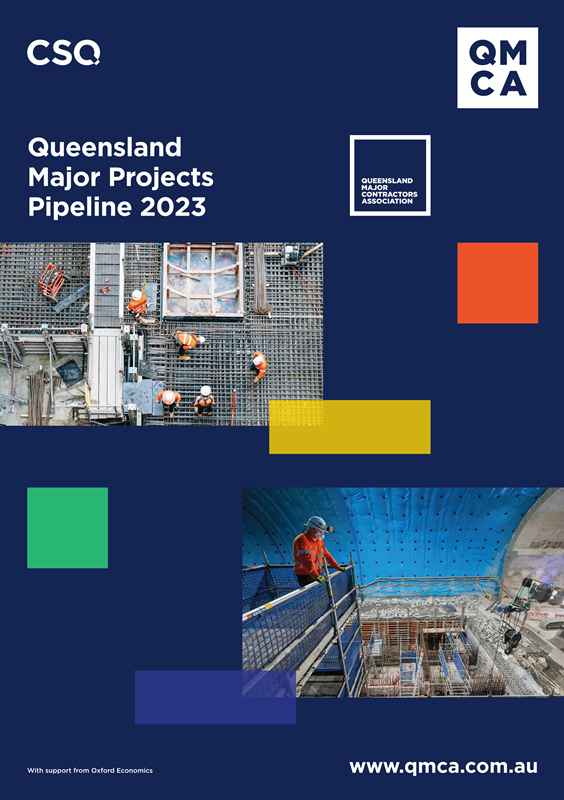
The value of Queensland’s major civil construction and engineering future project pipeline across the next five years has reached a record-breaking $92 billion according to the 2023 QMCA CSQ Queensland Major Projects Pipeline Report.
Authored by Queensland Major Contractors Association, Construction Skills Queensland and Oxford Economics, the report evaluates the state’s current market outlook and medium-term major project construction pipeline. The 12th edition showcases a resilient engineering construction sector in Queensland, with the report forecasting a robust increase in project activity despite the prevailing economic challenges.
- DOWNLOAD THE REPORT EXECUTIVE SUMMARY
- DOWNLOAD THE FULL QUEENSLAND MAJOR PROJECTS PIPELINE REPORT
- DOWNLOAD THE REPORT DATA SETS
- DOWNLOAD THE QMCA BRISBANE EVENT SLIDE DECK
QMCA CEO Andrew Chapman states, “We are witnessing a historic upswing in our industry’s trajectory. The next five years will be crucial as we navigate the complexities of cost, capacity, and productivity to deliver on Queensland’s $92 billion project pipeline.”
The 2023 report reveals a remarkable 29% year-on-year growth, with the current five-year pipeline now valued at $92 billion. Funded projects have seen a notable increase to $57 billion, driven by significant investments in utilities and mining across the state’s key regions. The funded projects over the next few years going forward amount to an average of $10.5-12 billion per year with the peak of funded activity in the 2026/27 year.
“The diversity of work in the pipeline is extensive and covers all the sectors with planned works from transport through to water and the energy transition infrastructure and mineral resource developments. A diversified project portfolio ensures sustainable growth and stability for Queensland’s economy. It is also very encouraging to see that the proportion of credibly funded projects has grown, providing certainty for asset owners, the industry and our supply partners who will support projects across Queensland,” said Andrew.
The report also underscores the challenges of high unfunded activity, with a forecasted peak in 2026/27, and the imperative for strategic funding and financing solutions to sustain momentum.
“The public sector continues to play a significant role, funding over half of the total pipeline activity and while we are seeing increased investment from the private sector in renewables, energy and resources projects, we still believe more can be done in the planning and approval process to boost private sector investment in Queensland further, as well as looking at co-funding opportunities,” said Andrew.
There are many challenges to the delivery of this pipeline and chief amongst them are the lift in employment required to deliver the pipeline of works; as well as addressing the industry’s flagging productivity. The report outlines some potential approaches in these areas to ensure that industry can address falling productivity quickly and be in a position to deliver the work needed, without impacting the upcoming 2032 Games.
“Government and industry have a dual role to play in getting the settings right to deliver the pipeline efficiently and effectively. At the present time, there is work to do to address this,” said Andrew.
Regional Breakdown
Major project outlooks differ considerably by region. Compared to last year, funded work has declined by 23% in the Ipswich-Toowoomba-Logan region and 33% in Darling Downs-Maranoa while increasing in all other areas. Wide Bay and Townsville have received the highest growth in pipeline-funded work at 497% and 196%, respectively with projects in the utilities (specifically electricity and defence) and mining and heavy industry sectors driving growth.
On regional disparities, Chapman notes, “While we celebrate the growth in regions like Wide Bay, Fitzroy, and Brisbane, we remain vigilant about the declines in other areas, particularly as major projects are reviewed by the Commonwealth and marked for deferment or cancellation. This is most noticeable in the Ipswich-Toowoomba-Logan region and Darling Downs-Maranoa as Inland Rail’s review and changes in scope impact the overall pipeline.”
“Our focus is on balanced and proportionate development across all regions, and while we understand that disparities will occur, there is a concern across the industry about how tightening Commonwealth investment will negatively impact regional Queensland,” said Andrew.
Skills and Workforce Development
CSQ Acting CEO Geoff Clare said the new wave of construction activity would challenge an industry already struggling with labour shortages:
“The significant projected uplift in the construction industry in Queensland will push labour demand to record levels,” Mr Clare said.
“With shortages in construction already prevalent across all occupations, the industry’s struggle to find workers will intensify,” he said.
“This will be acutely felt in the delivery of civil infrastructure projects and in the regions.
“Today’s civil construction workforce of around 34,000 is already struggling to meet current demands – with open vacancies twice the levels of those seen before the pandemic.
“By mid-2028, the monthly headcount demand for the civil infrastructure pipeline is expected to reach 50,000 – double current levels in this sector.
“Around 70% of projected labour demand will be concentrated in regional and remote Queensland.
Mr Clare said previous solutions to fill regional workforce gaps would not be enough in an unprecedented chapter of widespread demand.
“While labour mobility has provided a solution to localised shortages in the past, we are moving into a period where major projects will be active in multiple regions and there are simply insufficient skilled workers to cover all areas.
“Migration will be insufficient to bridge the gap, so building our own local talent pool is critical.
“It will be a challenge for industry and government to broaden the prospective pool of construction recruits.
“Unfortunately, recent data on civil apprentice commencements is discouraging at a time when we need more new entrants.
“We recognize that we will need a bigger cohort of students and recent school leavers to hear about the opportunities in this industry and that women represent an underutilized pool of talent.”
Recommendations
To successfully deliver the state’s $92b pipeline, QMCA advocates for increasing capacity, enhancing skills and technology adoption, and managing cost escalation risks while embracing opportunities presented by innovative and sustainable construction techniques and collaborative procurement strategies.
“Our recommendations are clear: strengthen the supply chain, invest in labour development, maximise funding avenues and ensure a collaborative approach to contracts to share risk and reward. This strategic approach will not only bolster productivity but also fortify the foundation of our industry for the future,” said Andrew.
ENDS.
About the Report and Additional Data
The 2023 QMCA CSQ Queensland Major Projects Pipeline Report is proudly supported by:
Platinum Partners – CSQ – Construction Skills Queensland
Gold Partners – Clough and Western Downs Civil
Regional Partners Brisbane – Bennett + Bennett and John Holland
Regional Partners Toowoomba – Bennett + Bennett and Stanwell Corporation Limited
Regional Partners Townsville – BMD Group and Sunwater
Regional Partners Gladstone – Coffey Testing and Stanwell Corporation Limited
Report Partners – Degnan and stratagility
Event Partners – Toowoomba and Surat Basin Enterprise, Townsville Enterprise (TEL) and Gladstone Engineering Alliance
A complete media pack, including key graphics, regional breakdowns, full report data spreadsheet, report copies and more is available for download at: Media Assets
Produced by the Queensland Major Contractors Association, Construction Skills Queensland and BIS Oxford Economics, The Queensland Major Project Pipeline Report gathers data from over 200 projects, each with an engineering construction value of $50m or greater, organised into 12 sectors and 11 regions.
Each project in the pipeline is separately assessed as either funded or unfunded and then assigned to one of six different project statuses:
- Funded
- Announced
- Under Procurement
- Under Construction
- Unfunded
- Credibly Proposed
- Prospective
- Unlikely
Regional Breakdown
The pipeline can be broken down across the following regions:
- Cairns $1.8b
- Townsville $4.2b
- Mackay-Isaac-Whitsunday $5.1b
- Fitzroy $4.3b
- Wide Bay $9.7b
- Brisbane $8.3b
- Sunshine Coast $2b
- Gold Coast $4.4b
- Ipswich-Toowoomba-Logan $5.5b
- Darling Downs-Maranoa $3.5b
- Outback $4.7b
















